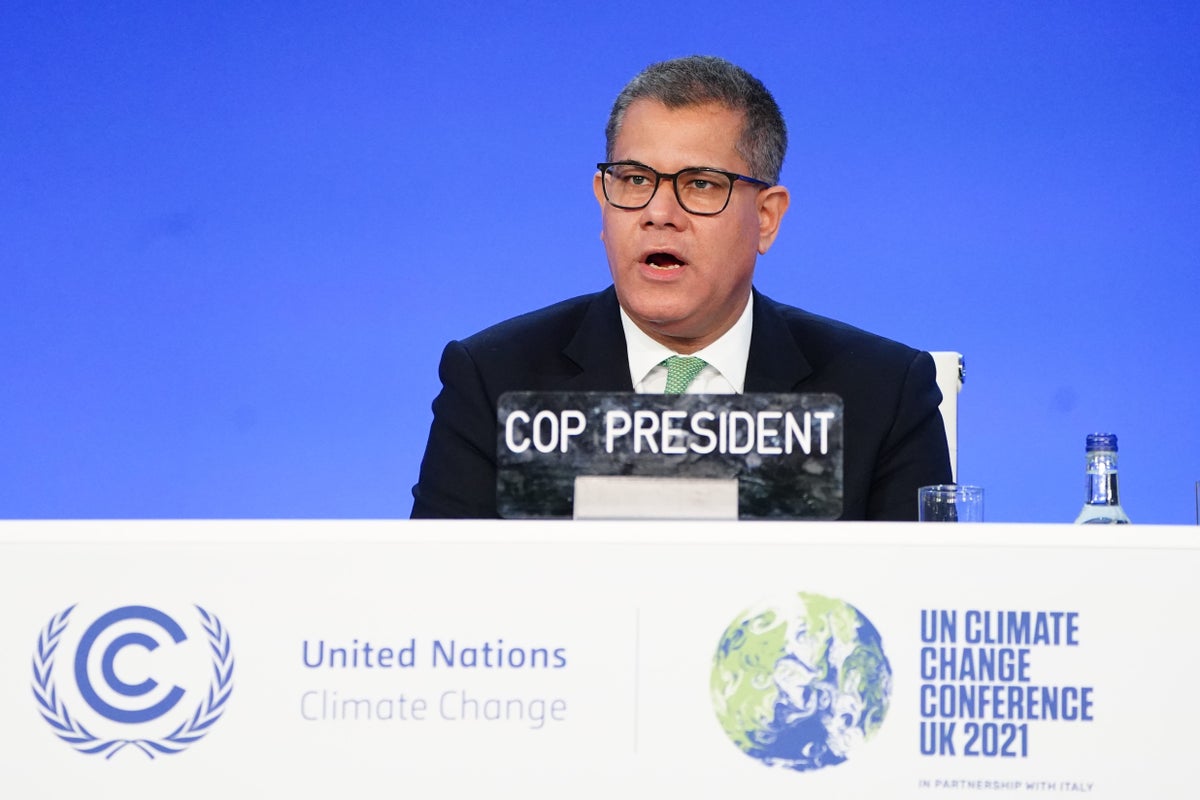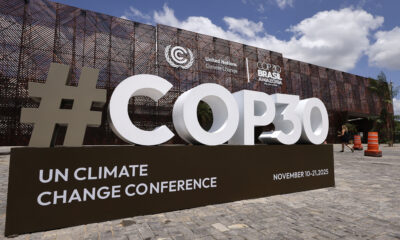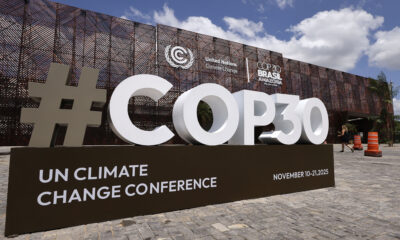Science
UN Climate Summit Websites Emit Seven Times More Carbon

Websites promoting the UN’s Conference of the Parties (COP) climate summits generate approximately seven times more carbon emissions than the average website, according to a recent study conducted by researchers at the Edinburgh College of Art. This alarming finding comes as the internet is already responsible for about 3% of global carbon emissions. The carbon footprint of official COP host country websites significantly exceeds that of typical web pages.
The study, published in the journal PLOS Climate, highlights that average emissions from COP websites have surged by over 13,000% since the inaugural summit in 1995. With COP30 scheduled to take place in Brazil from November 10 to 21, 2023, experts are concerned that the conference is not being hosted on verified renewable energy infrastructure.
Significant Rise in Emissions Over the Years
Researchers from the Institute for Design Informatics utilized web archive data to examine the carbon footprint of COP websites over a 30-year span. Their analysis revealed that emissions remained relatively modest until COP14 in 2008, with each page view generating the equivalent of only 0.02g of carbon. However, from COP15 onward, emissions have escalated sharply, with average emissions exceeding 2.4g of carbon per visit. In contrast, the typical website emits around 0.36g of carbon per page view.
In 1997, during COP3—the first year for which data is available—website views emitted an equivalent of 0.14kg of carbon, roughly the amount absorbed by a mature tree in two days. By the time of COP29, homepage visits alone produced a staggering 116.85kg of carbon, necessitating the absorption efforts of up to ten mature trees over an entire year. This represents an increase of more than 83,000% in carbon emissions.
Factors Contributing to Increased Emissions
The sharp rise in emissions correlates with the increasing use of high-demand content on COP websites, such as multimedia files that require greater computing power. Researchers emphasize the need for immediate action to reduce the digital footprint of these websites. Recommendations include implementing strict limits on page sizes, optimizing site layouts, and ensuring that hosting servers are powered by renewable energy.
Professor Melissa Terras from the Institute for Design Informatics remarked, “The digital footprint of websites, and how they have grown over time, deserves further scrutiny.” She noted that COP conferences are central to discussions on climate change, making their environmental impact particularly significant. The research team’s findings underscore that even organizations dedicated to environmental protection often overlook the carbon cost associated with their digital presence.
PhD student David Mahoney added that websites are a prevalent form of human-computer interaction and represent one of the largest contributors to the internet’s overall environmental impact. He highlighted how the innovative reuse of web archives can shed light on this growing blind spot, even among entities engaged in climate discussions.
Professor Frauke Zeller also expressed enthusiasm for the research, emphasizing its potential impact on broader academic and societal discussions. The analysis stands as a pioneering example of how web archives, such as the Internet Archive, can be utilized to track the environmental impact of websites over time.
COP representatives have been contacted for comment on these findings, as the discourse surrounding the environmental implications of digital infrastructure continues to evolve.
-

 Entertainment2 months ago
Entertainment2 months agoAnn Ming Reflects on ITV’s ‘I Fought the Law’ Drama
-

 Entertainment3 months ago
Entertainment3 months agoKate Garraway Sells £2 Million Home Amid Financial Struggles
-

 Health2 months ago
Health2 months agoKatie Price Faces New Health Concerns After Cancer Symptoms Resurface
-

 Entertainment2 months ago
Entertainment2 months agoCoronation Street’s Carl Webster Faces Trouble with New Affairs
-

 Entertainment2 months ago
Entertainment2 months agoWhere is Tinder Swindler Simon Leviev? Latest Updates Revealed
-

 Entertainment3 months ago
Entertainment3 months agoKim Cattrall Posts Cryptic Message After HBO’s Sequel Cancellation
-

 Science3 weeks ago
Science3 weeks agoBrian Cox Addresses Claims of Alien Probe in 3I/ATLAS Discovery
-

 Entertainment2 months ago
Entertainment2 months agoOlivia Attwood Opens Up About Fallout with Former Best Friend
-

 Entertainment3 months ago
Entertainment3 months agoMarkiplier Addresses AI Controversy During Livestream Response
-

 Entertainment3 months ago
Entertainment3 months agoMasterChef Faces Turmoil as Tom Kerridge Withdraws from Hosting Role
-

 Entertainment4 months ago
Entertainment4 months agoSpeculation Surrounds Home and Away as Cast Departures Mount
-

 World2 months ago
World2 months agoCole Palmer’s Mysterious Message to Kobbie Mainoo Sparks Speculation





















